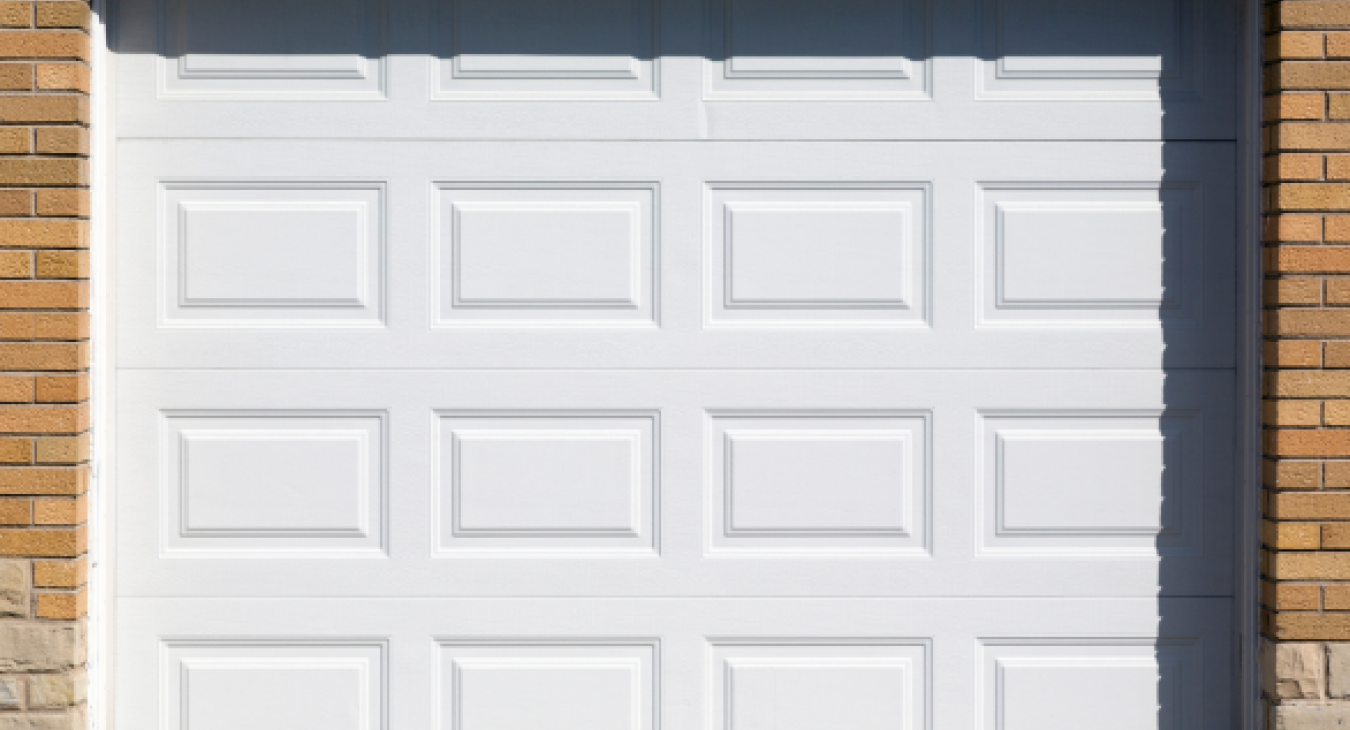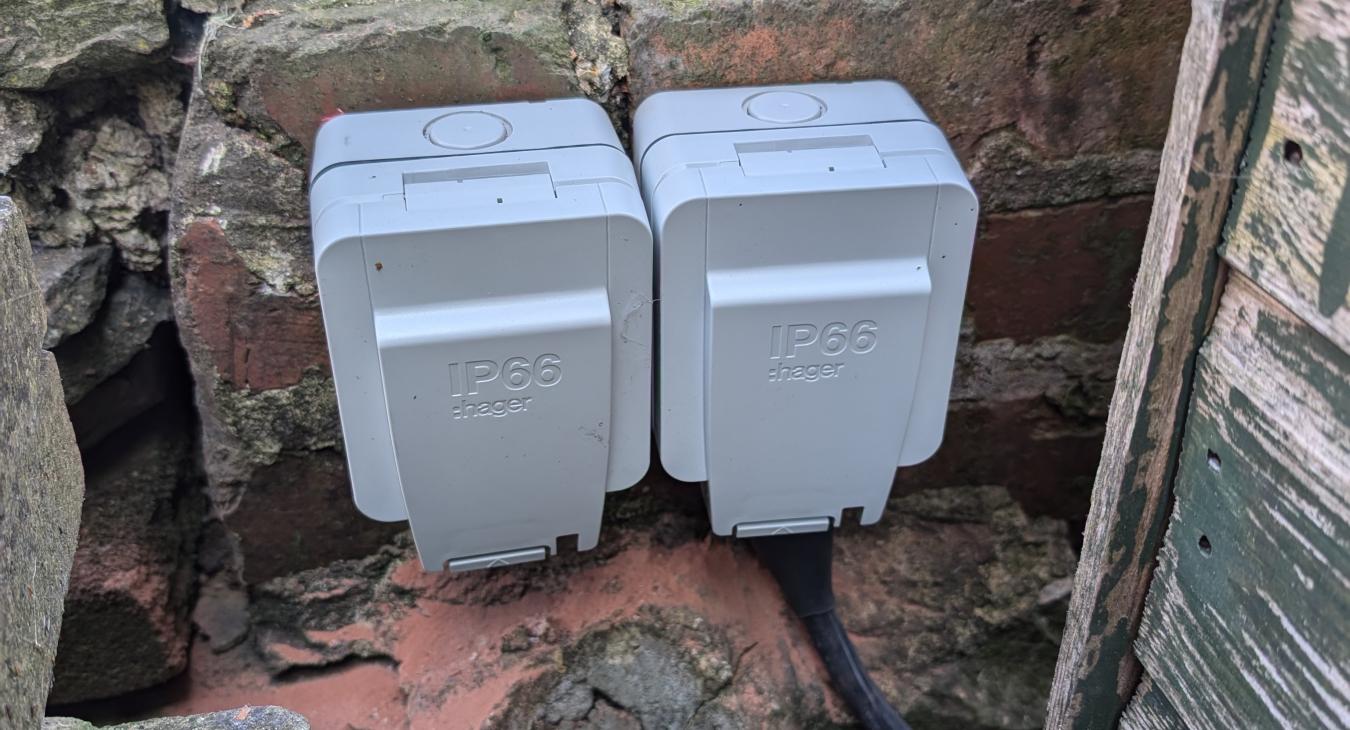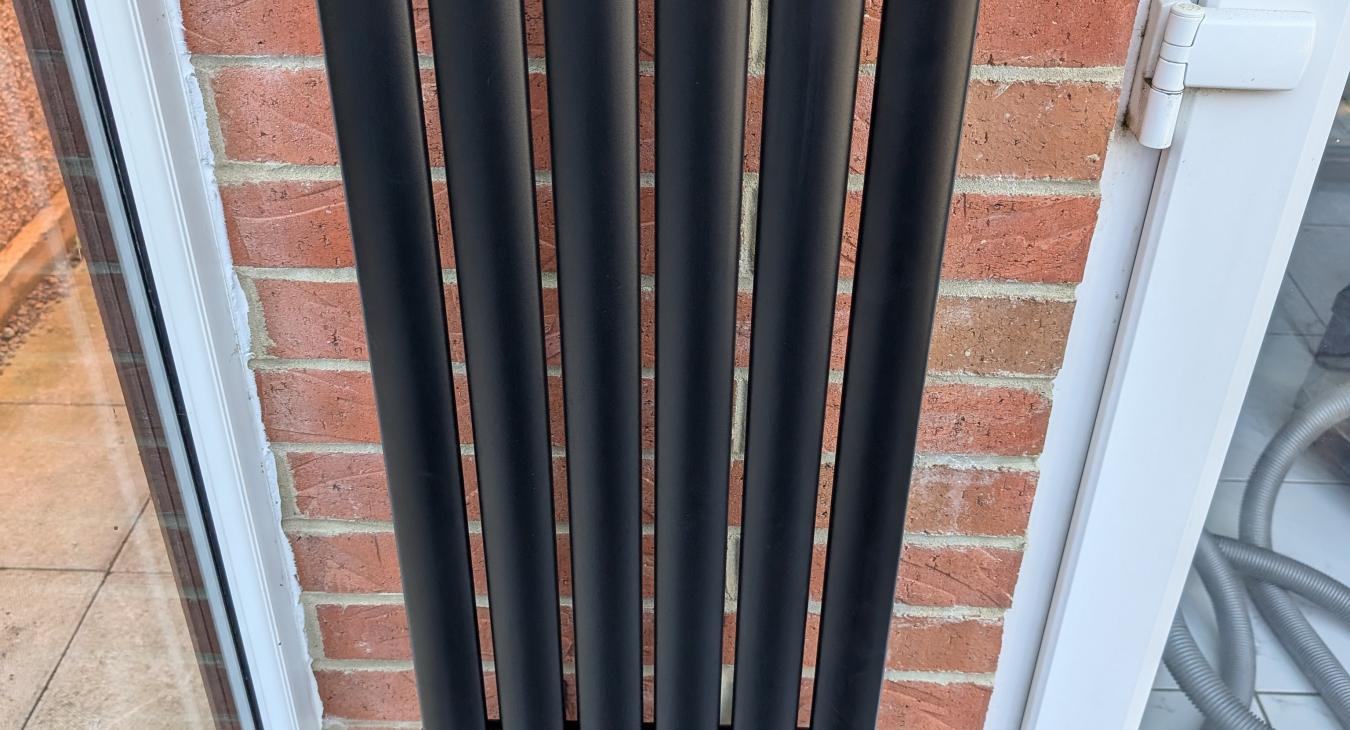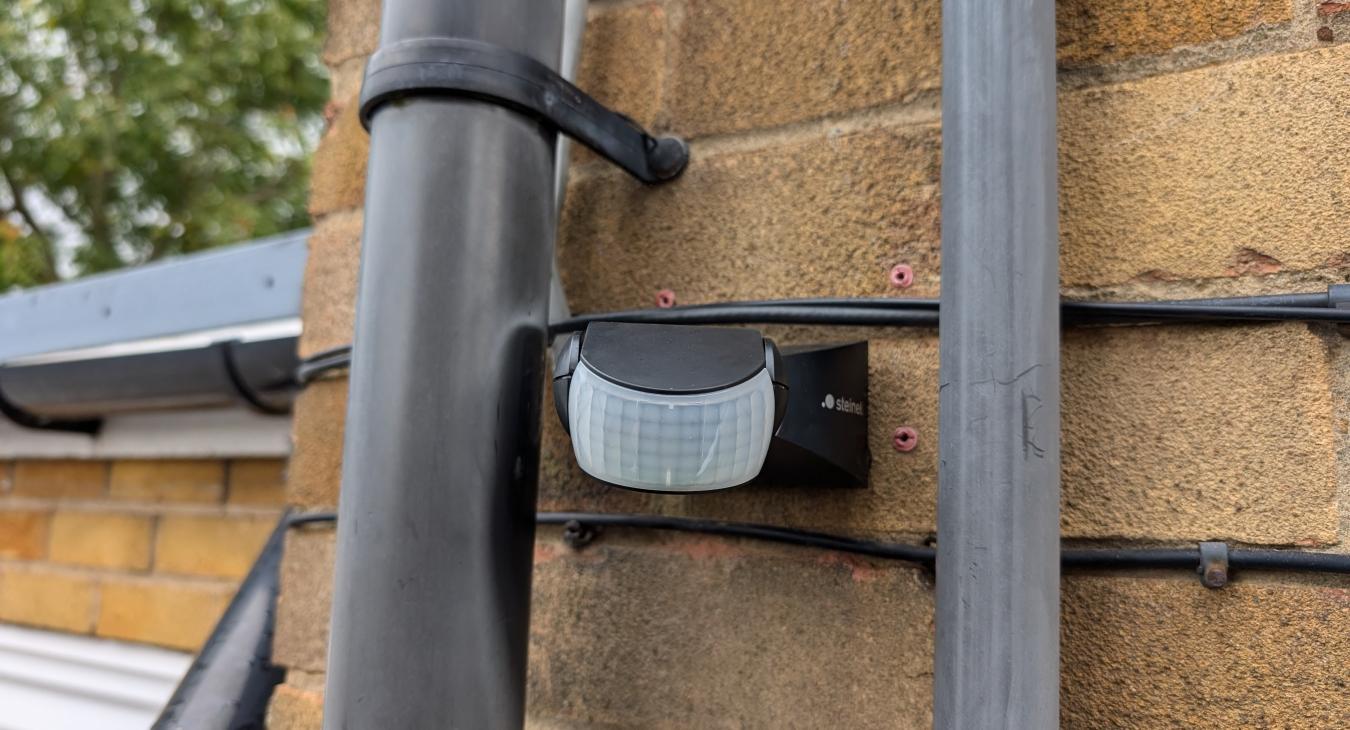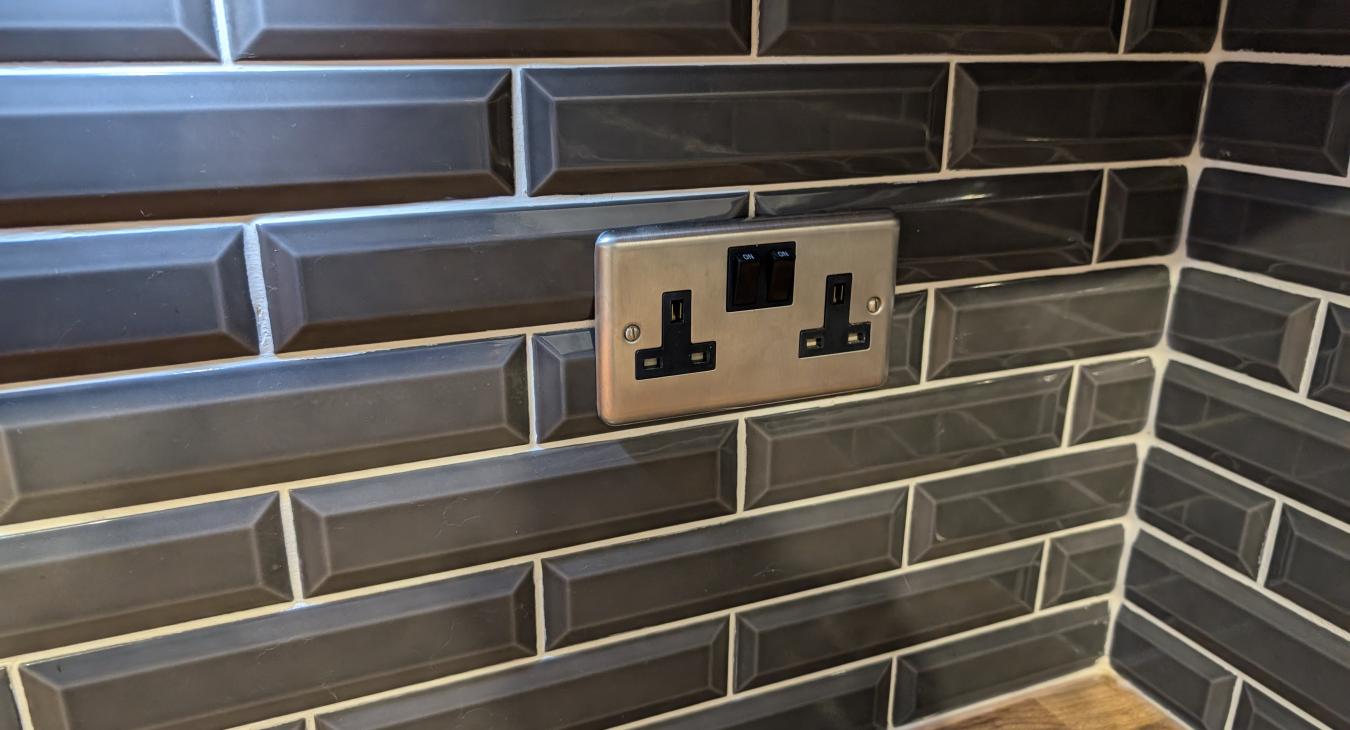Electric garage doors usually need a standard 13-amp power supply. The key thing is making sure your existing wiring can handle the extra load safely. If your garage doesn’t already have power, you’ll need a dedicated supply installed. It’s also worth having surge protection in place to help protect the motor from any unexpected power surges. If in doubt, speak to an electrician before installation to make sure everything is set up properly.
If you’re planning on running multiple sockets, lighting, or even power-hungry equipment in your garage, then having a separate consumer unit is a good idea. It helps protect the circuits and makes it easier to isolate power to the garage if needed. Plus, it keeps everything organised and safer in case of an electrical fault.
Running electricity to your garage isn’t as simple as plugging in an extension lead. The safest way is to install a proper electrical supply using armoured cabling to protect against damage and ensure it’s safe for outdoor use. It’s also important to have RCD protection in place to keep you safe from electrical faults. If you’re unsure, it’s always best to get a qualified electrician to take a look and make sure everything is done properly.
A Positive Input Ventilation (P.I.V) unit is a whole-house ventilation system designed to improve indoor air quality and reduce condensation, damp, and mould. It works by drawing fresh, filtered air from outside and gently distributing it throughout your home, creating a positive pressure that pushes out stale and moisture-laden air.
P.I.V units are energy-efficient, but running costs vary throughout the year. Based on real-world usage, a fair estimate for the annual average running cost is 25-30p per day.
A breakdown of estimated costs:
- Warmer months: Fan only (~10p per day)
- Milder months (March, October, November): 20-30p per day (occasional heater use).
- Coldest months (December - February): 40p - £1.00+ per day (frequent heater use).
Overall, they remain a cost-effective solution for improving air circulation and reducing moisture-related issues, but users should expect higher electricity usage during colder months.
An extract fan is designed to remove air from a single room, such as a bathroom or kitchen, where moisture and odours accumulate. It works by sucking out stale air, creating negative pressure in that space.
A P.I.V unit, on the other hand, works for the entire home. Instead of extracting air, it introduces fresh air from outside and distributes it evenly, creating a gentle airflow that forces moisture and pollutants out through natural leakage points like vents and gaps around windows and doors.
Expect to adjust your heating in winter when using a P.I.V unit. Even with a built-in heater, the system introduces fresh air, which may slightly reduce indoor temperatures. While the heater helps temper the air, it is not designed to warm the entire home. If the unit is installed in your landing, for example, you may need to adjust your heating settings slightly to maintain comfort levels during colder months.
The safest approach is to contact a pest control expert to handle the rats and prevent further infestations. If you suspect rats have chewed through your wiring, it’s essential to have a qualified electrician inspect your system for damage. Finally, consider installing rodent-proof materials that don’t pose electrical risks.
If you plan to use steel wool, it’s crucial to turn off your electricity at the consumer unit first. This ensures there’s no risk of electric shock if the steel wool touches a live wire. You should also avoid placing it near areas where cables are visible or suspected, as this could create further risks. Alternatives like expanding foam or other pest-proof materials might be safer options.
Steel wool is often suggested as a way to block gaps because rats dislike chewing it. However, using it near electrical cables can be extremely dangerous. If the steel wool touches a live wire, it can become electrified and cause an electric shock, a short circuit, or even a fire.
Exposed live wires can cause a variety of problems. They pose a risk of electric shock if touched, can lead to short circuits that may damage your appliances or cut off power, and worst of all, they could start a fire if the wiring sparks or heats up.
Rats have teeth that grow continuously, so they need to gnaw on materials to prevent their teeth from overgrowing. Unfortunately, electrical cables are often targeted, and when they’re chewed, it can expose live wires, creating serious electrical hazards.
Yes, there are many energy-efficient extractor fans designed to use less electricity while maintaining strong airflow. These models can help lower energy consumption while providing effective ventilation, making them an environmentally friendly choice for your home.
Yes, extractor fans can improve air quality by removing moisture, mould, and airborne particles. This helps reduce allergens in the home, making it a more comfortable environment for those with asthma or allergies.
Signs that your extractor fan might need replacing include increased noise, reduced airflow, or visible mould or moisture build-up in the room. Regular maintenance and checks can extend the fan's lifespan, but replacement may be necessary if it’s no longer functioning effectively.
Yes, extractor fans can be installed in rooms without an external wall by using ducting to vent the air outside. Inline extractor fans are a great solution for spaces like lofts or areas where wall-mounted units aren’t suitable.
Yes, even if you have a window, an extractor fan is much more effective at removing moisture and odours. Windows might not always provide sufficient ventilation, particularly during colder months, whereas an extractor fan works year-round to reduce humidity and help prevent mould.
Yes, you can relocate these but you will need to consult your local DNO/Energy provider to discuss. This would not be a job carried out by a local electrician. Call 105 to discuss further.
Yes you can move your fuseboard to a new location, This would require an inspection of your currently electrics and then a quotation to relocation/install an new consumer unit and cables to its new position. Contact your local electrician for more information.
A good quality energy saving dehumidifier 20L ran for 12 hours costs around 60p per day. Which will be around £219 per year.
A standard through the wall fan will cost less than 1p per day to run, whilst bigger fans like a centrifugal fan can cost around 4p Per day.
We advise using a good quality Axial fan with trickle function (DMEV) in all bathrooms, providing the fan is installed through the wall.
This sounds like great place but in reality its not the case, water from the shower pushes air away from the fan which means that the fan works harder and less effectively.
Moving the fan away from the bath/shower area with see better results.
A good way to clean an extract fan is to use a small Kettle spout brush. Holding the impeller with your fingers put the brush in and out of the fan, this will clean most of the dirt.
IF the fan is greasy this may be a little more difficult, You may need to use a damp cloth to wipe or a little water on the brush to clean.
Extract fans in a home can be very deceiving and although spinning this isn’t a sign that the fan is working. Cheaper fans usually look and sound the part but don’t actually extract as they should.
The only way to know if your fan is working is to have it tested with the correct air flow equipment.
There are many ways to remove condensation in your home, but the best way is to have adequate ventilation in your property. For older homes this is usually through good extractor fans in your Kitchen and Bathroom, but also having trickle vents in every window.
When selecting a light fitting, I would only install where possible fittings with replaceable bulbs. A lot of fittings come with integrated LEDs and this can be ok until they stop working.
If this happens the full fitting has to be replaced which could cost an additional installation fee.
Light fittings can be tricky to find as there is so much choice. Its easier for me to say where not to buy.
Do not buy light fittings from Amazon or eBay Unless they are made by a recognised company.
Amazon and eBay do not need to abide by the same regulations as stores in the UK as it is classed as a market place, so most light fittings although a lot cheaper are not necessarily safe for installation here in the UK.
We don’t usually supply decorative light fittings, this is because, everyone has their own taste. I can almost guarantee that whatever I suggest will be wrong. So we always recommend you get your own light fittings in this case.
I would say I am reasonably priced for the service I provide and my prices are competitive with those of similarly qualified electricians.
Our prices are different to those of an unqualified electrician. We don’t compete with these electricians. They are not properly trained, have less reputable business practices, and are not registered with the NICEIC.
Yes, As part of being a member of the NICEIC it is a requirement that we are insured to carry out all aspects of electrical work in your property.
In fact, we are insured above the industry Norm to ensure that you are covered in case something does go wrong!
An RCD short for Residual Current Device, is a piece of electrical equipment designed to protect a person from a fatal electric shock. Unlike a standard circuit breaker that is designed to protect the cable.
Intermittent faults can be tricky to find, but not impossible. The key information we need is the time of day and is there a pattern when the fault occurs…for example when you use a certain appliance or every time it rains.
We can usually find and repair most faults within the first hour. Some trickier faults can take longer.
We can offer two services depending on the description of the fault:
We can come to your property for one hour to diagnose the fault, or come on our hourly rate to find and repair the fault.
Some faults take longer than an hour to repair if new wiring is required, or floors are to be lifted.
We provide a 2-year guarantee on all parts provided by ourselves and labour. We also provide 5-years on workmanship.
No, This is something we do not do unless specifically requested.
We do not hold a waste carriers license to carry commercial waste, which means we cannot transport it and dispose of it. If you do want us to remove all waste then we can arrange for a collection at an extra cost.
Buying LED is the most energy efficient lightbulb.
There was a time when choosing a lightbulb was a simple task. Now it seems that the introduction of LED Bulbs has made things a little confusing. Finding 2 wattages on the same package is a typical issue.
When it comes to LEDs your light bulb will vary between 3-10w so the lowest number of the two will be what you are looking at and what you need to be careful of when comparing to new light fittings and what bulbs they can have in them.
Warm white is a more inviting colour for the home and is the most common colour range is between 2.5-3k - we recommend this throughout the home.
Daylight / Cool White can be crisp and colder feeling and is typically used in Bathrooms and kitchens. Colour range can vary between 4k-6k.
In older electrical installation bathroom light fittings (specifically downlights) not only have a bulb to replace but also a transformer. These have been installed to keep you safe and depending on the condition of your fuse board you will more than likely need to replace the transformers.
In some cases these old box’s are still okay to use, but lack the necessary safety requirements like RCD protection that more modern consumer units now have.
Rewirable fuse boards are certainly a thing of the past and we recommend an electrical inspection be carried out to ensure it is still safe to be in operation.
Most house have electrical bonding to their gas and water pipes. A good indication that you have electrical bonding is a large Green and Yellow cable (Earth) attached to your Pipework.
In a typical house bonding is installed to your water pipes and Gas pipes.
Bonding can usually be found at your Water Stop tap, Typically under your sink, and Gas meter.
In most cases if this what you have in your property, Your water supply will not need an earth bond. It may be that your electrician will have to test this to confirm.
You can go to www.defibfinder.uk to locate any defibrillator near you.
According the Part P of the building regulations some types of electrical work should be registered with your local council. You can either use an NICEIC registered Electrician who will do the paperwork for you or you can apply for this yourself which can be quite costly.
You will need a Notification if you have a replacement fuse board, have a new circuit installed, a Full or part rewire and any modification works in your bathroom (excluding a like for like replacement of equipment).
As this is separate to your test certificate you can expect this to arrive a few days after the invoice, and direct from the NICEIC.
When we rewire a property we use a chasing machine with dust extraction. This means that most (but not all) fine dust will be removed from the work, making the work a little less messy.
We do try to catch the remaining debris using dust sheets and carpet protection.
In an ideal world it would be great for our customers to move out and have the house empty before we start a rewire, but we understand that this is not always possible.
We can and do work around our clients, but please keep in mind that your home will not be as it was while the work is carried out. Furniture and other bits have to be temporarily relocated to get to all sockets and switches.
At the moment we only accept Bank transfer, Cheque and Cash. Our preferred methods of payment are currently Cheques under £1000 or bank transfer.
When we arrive at the property we will need access to the area we are working, and this should be cleared to prevent any accidental damage of your household goods. We also need to access to your fuse board, again please make sure this area is a clear as possible for us to prevent any delays with the work.
We think that you should leave the shower switch on when not in use. If you feel more comfortable use it when you go away for a longer period of time like a holiday.
A loose connection in a shower pullcord switch is quite common, the internal connections can come loose over time and by pulling the cord every day it can increase the likelihood of this.
For most small jobs we do not, but larger jobs will require a power supply for things like power tools and battery chargers.
If we require the use of power for smaller jobs we will of course ask before we do so.
Yes we do. We provide a 2-year parts and labour guarantee on all our work, as long as we have supplied all the materials that have failed or require replacing.
You should have it installed to protect your electronic equipment at home. This could be washing machines, Tv’s Phones and even LED lightbulbs.
That said, You can opt out of having surge protection installed if you believe it will not be financial feasible for your electrical work.
This does affect most jobs at your home. If you are adding anything to your electrical installation it is important that your electrics are safe before we start our work. This allows us to install electrical work safely at your home and issue the relevant electrical certificates.
Depending on the type of electrical work you are having installed you may need to replace your RCD. This is due to recent electrical regulation changes (Sept 22).
Most properties have the incorrect type of RCD in place at the moment. Digital electronics may affect how the RCD operates and in some cases it may not do what its supposed to do, which is save lives.
Work that usually involve new wiring are affected by this, that said it is a good idea to have a look at what you have installed to make sure your electrics are up to scratch.
Unfortunately, nothing should be installed inside a meter cupboard except from your homes main switch, Henley blocks, electric meter and service fuse. This is according to the electrical power networks regulations.
Installing a fuse-board inside the electrical meter cupboard can bring its own issues and we have attended quite a few properties where we have had to relocate this work so that a smart meter can be installed.
Not necessarily, you can replace the heating element in most ovens and this is often the cause of the issue.
Always used an experience and registered electrician for this process, so that they can check that this is the only issue.
Yes, we are a proud member of the NICEIC, which means you are guaranteed a great job, and are protected by their platinum promise for 6 years if something isn’t quite as it should be.
Even though RCDs are more sensitive, you shouldn't be regularly resetting the unit. This indicates an issue with your electrics, and you should seek a registered and qualified electrician.










